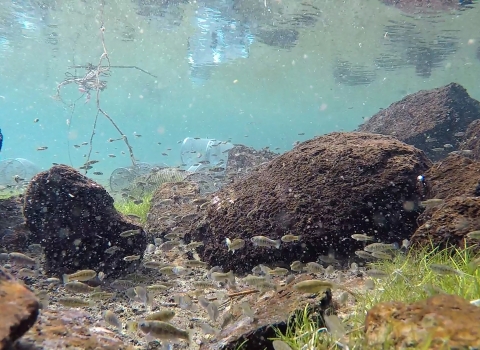On April 21, the Bishop Paiute Tribal Council along with Tribal staff, the U.S. Fish and Wildlife Service, California Department of Fish and Wildlife and the Los Angeles Department of Water and Power came together to release endangered Owens pupfish into the newly established Owens Pupfish Refuge within the Tribe’s Conservation Open Space Area.
“Establishing the Owens pupfish on tribal lands is a real reason to celebrate. The fish have played such an important part of our cultural history. We are so happy that we have finally arrived at this point where we have worked through the logistical and legal hurdles involved and found the means to contribute to the protection and recovery of the fish both on and potentially off-reservation,” said Meryl Picard, Tribal Chairwoman.
Once widespread up and down the Owens Valley in the network of ponds and sloughs that make up the Owens River watershed, the Owens pupfish was once a staple food item for the local Paiute, who caught fish by the hundreds and dried them for storage and later eating. Owens pupfish are small, rarely larger than two and a half inches long. The females are a dusky, olive-green color and the males are bright blue, particularly during their spring and summer spawning season. The pupfish gather in small schools and eat mostly aquatic insects. They were listed under the Endangered Species Act in 1967 and are threatened by habitat loss, predation by introduced, non-native fish and amphibians, and climate change climate change
Climate change includes both global warming driven by human-induced emissions of greenhouse gases and the resulting large-scale shifts in weather patterns. Though there have been previous periods of climatic change, since the mid-20th century humans have had an unprecedented impact on Earth's climate system and caused change on a global scale.
Learn more about climate change .
Implementation of this project is an important milestone in a 15-year journey for the Bishop Paiute Tribe, taking a proactive approach to the conservation of a local protected species. The Service worked with the Bishop Paiute Tribe to finalize a Safe Harbor Agreement, which means the Tribe can establish and manage this new, seventh, population of Owens pupfish without additional regulatory burden for the duration of the SHA.
“Safe Harbor Agreements are an important tool for endangered species recovery, and we are so honored to be a partner to this historic moment for the Tribe and for Owens pupfish,” said Fish and Wildlife Service Pacific Southwest regional director Paul Souza “The Tribe’s efforts to see this project through speak to their inherent dedication to the stewardship of the land, and the fish, wildlife and plants within.”
Follow along as Bishop Paiute Tribe Environmental Management Office staff and partners gather Owens pupfish for release in their new home: Bishop Paiute Tribe COSA.



